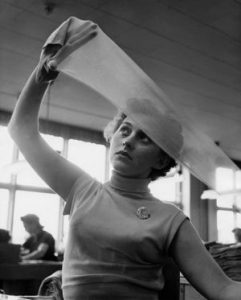The Intuitionist: Where Black Men Tell White Lies and Silence Turns Loud
The human experience, as subjective and relative as it may be, is rooted deeply in two worlds: that which can be seen and physically touched, and that which cannot. As Colson Whitehead tells the story of Lila Mae’s life in the dystopian elevator world of The Intuitionist, he explores the complexities of racism and religion by illuminating the invisible grounds in which they are rooted.
Investigating the Death of the Author in Paul Auster’s City of Glass
The structural critic describes the characters of a novel as nothing more than “the noise of their name” (Gass, 1970, 49), as any fixed aspect of the narrative structure to which the reader will always return as “music returns to its theme” (49). By emphasizing the instability of the structural character, the poststructural Derridean deconstruction seeks to expose a Trace – language’s innate absence and Nothingness – to demonstrate that the end and origin of all literature belongs not to the author and their characters, but to language.
The Sound of Scandal: An analysis of the thematic significance of jazz in Toni Morrison’s Jazz
While many critics of Toni Morrison’s novel Jazz choose to focus on her use of the music form’s distinct structure in the narrative voice, jazz music itself also plays a vital thematic role in the story. By incorporating motifs of jazz into her Harlem-based narrative, Morrison urges readers to draw comparisons between jazz music and the decadent yearnings of her characters, as well as notice the City’s influence over these seemingly personal drives through the intimate connection jazz has to it.
Guilty Women: An Analysis of Angela Carter’s “The Bloody Chamber” Utilizing Laura Mulvey’s Theories of Scopophilia and Female Narrative Roles
She stands alone in a crowded room. Her hair captures the light, framing her face with soft, ethereal radiance. She smiles gently at the people around her, yet remains still, untouched, as though she is waiting for something to happen.
Where did Plato and Galileo search for truth? The inward and outward search for epistemological and metaphysical certainty
Creating a binary between looking inward and outward when thinking about philosophy is obfuscatory, particularly when dealing with the works of Galileo and Plato. Galileo literally gazes at the sun until he is blind, while Plato looks into his mind at a metaphorical sun, revealing the primary distinction between them in their search for epistemic and metaphysical truth.
From Words to Images: A Comparison of Paul Auster’s City of Glass and Its Graphic Novel Adaptation
Paul Auster’s novel, City of Glass, fabricates a world in which appearances often fail to correspond to reality and the readers can be as confused and bewildered as the characters in the novel. To adapt City of Glass into a graphic novel, where images on every panel supplement a significantly-reduced amount of text, constitutes a considerable challenge.
Sylvia Plath: The Devil and The White Macaw
Sylvia Plath’s Esther Greenwood has a complex understanding of her enlivened friend Doreen, which makes her long for a similarly spirited disposition. Esther’s existence is instead confined by the ever-present thoughts of death plaguing her mind.
Female Forces Behind the Mask: Rorschach’s Path to Violence and Heroism
There are few things that are black-and-white in Alan Moore and Dave Gibbons’ graphic novel Watchmen. Instead, heroes and villains and the justification of violence blur together into one disheveled and messy humanity.
Sebald’s Barbaric Poetry
“Nach Auschwitz ein Gedicht zu schreiben, ist barbarisch,” wrote Theodor Adorno. “To write poetry after Auschwitz is barbarism.” Since writing it in his 1949 essay, “Cultural Criticism and Society,” this sentence has been quoted and appropriated time and time again by writers, thinkers, and critics — some indignant, some philosophical, and some in agreement.
A Smidge too Manly, A Smidge too Motherly: An Analysis of Midge, the Friend-Zoned Female in Hitchcock’s Vertigo
“In a world ordered by sexual imbalance, pleasure in looking has been split between active/male and passive/female. The determining male gaze projects its phantasy on to the female figure which is styled accordingly” (Mulvey 11). This quote from Mulvey’s “Visual Pleasures and Narrative Cinema”, outlines her thoughts on classical Hollywood cinema, wherein woman is projected as image, and man is projected as the bearer of the look.









